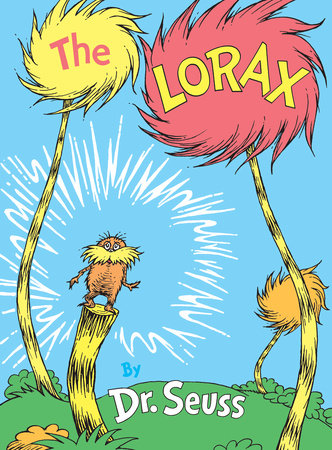Remember The Lorax?
I originally planned to make this post about the effects of deforestation in the Amazon Rainforest, but during my research I remembered a great book - Dr. Suess' The Lorax. Published in 1971, a few of you may be familiar with its story. Some of you may have seen the 2012 feature film. I had always understood the book and why the Once-ler was its antagonist, but I only recently thought about how strikingly relevant it is to environmental issues. This post still follows the deforestation theme I promised, but I'll be saving the in-depth discussion for next time. For now, I'll talk about why this book's message is important. So, spoilers ahead!
 |
| Figure 1: The book cover for Dr. Seuss' 1971 children's book, The Lorax. Its message is strikingly relevant to current environmental issues, particularly deforestation. |
For those of you unfamiliar, the book tells the story of the Lorax, who "speaks for the trees", and the Once-ler, who's out to make a profit. The trees in question are the 'Truffula trees' with "tufts softer than silk", which the Once-ler stumbles upon and decides to make clothing out of. While felling trees, the Lorax appears to warn the Once-ler to stop. The Once-ler doesn't heed the warning and continues his industrialisation of the Truffula forest. Eventually trees become sparse and the native animal species suffer the consequences. The Bar-ba-loots run out of Truffula fruits to eat, the Swomee-swans can't sing with smog in the air, and the Humming-Fish are forced out of their lake from the factory's pollution. The fall of the last-standing Truffula tree is heard, the Lorax flies away, and the Once-ler is left with a desolate, tree-less landscape before him.
The parallel this draws with the Amazon Rainforest is clear. Around 17% of forest in the Amazon has been lost in the last 50 years, due largely to conversion for cattle farming (WWF, 2017). Though lots of this is deforested to acquire valuables like mahogany, gold, and oil. A separate report published in September by the WWF (2017) claims that 381 new species were discovered between 2014 and 2015. The sheer abundance of species in the Amazon region showcases its almost unparalelled biodiversity. Under current forestry regimes, this diversity is seriously under threat. Deforestation and other disturbances in the Amazon can double loss of biodiversity (Barlow et al., 2016). Mercury has even been seen to pollute the Caqueta River in the Columbian Amazon (Olivero-Verbel et al., 2016). All of these real occurrences were addressed in The Lorax back in 1971, and they're still happening now. So, why is the book important?
Well, most people don't like scientific literature. I don't blame them. Ever read the Intergovernmental Panel on Climate Change reports? They're not fun. But the information is extremely important. While The Lorax and other books like it don't detail the science, the stories they tell make people aware of these very pressing environmental issues. I'd implore anyone who hasn't yet to give The Lorax a read. It's short, but the premise is thought-provoking. If you want to know about issues in the Amazon, stick around! You're in good hands... or at least we'll find out in January! For now, here's a thought-provoking picture, even if the wording is technically a little inaccurate. See you next time!
| Figure 2: A thought-provoking, albeit technically inaccurate, quote. It's unknown who said this. |
Great posting, really enjoyed the personal approach. Has given me some good ideas for a posting of my own. Will definitely link it to your
ReplyDeleteSorry for the late reply Nick. It's good to know that I've given you some ideas. I think I've read the post of yours that you're talking about. If I remember correctly, it was a very interesting read :)
DeleteHi Tom! I really enjoyed reading this post and think you put your points across in a really interesting (and humorous) way. I really like the link you've made between Dr. Suess' The Lorax and contemporary environmental issues such as deforestation. However, I think it would have been even better if you developed one of your examples such as the pollution of mercury in the Caqueta River which you could have then linked back to your original ideas. Nonetheless, you have got the important message across, and you raise a really important point that is also raised by Pawar and Rothkar (2015) regarding the need for public awareness.
ReplyDeleteIt will be interesting to see your future blog posts and how you develop your ideas.
Bailey
Hi Bailey. Thanks for the feedback. I plan to develop the mercury pollution (and a number of other issues) in future posts. I'm not yet succinct enough to have done it all in one post D: Thanks for your feedback nonetheless!
Delete